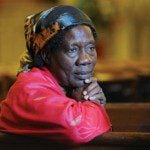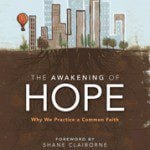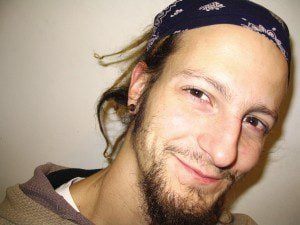Here at The Everyday Awakening, I’ve taken the release of Common Prayer Pocket Edition as a chance to both connect with folks who are part of a contemporary renewal of ancient prayer practices and re-connect with some of the wise guides who’ve taught me the most about prayer. (Hope you’ve already had a chance to read my interviews with Phyllis Tickle and Steve Harper. Hope, too, that you’ll send us a picture of Common Prayer ‘On the Go’ this week and get a free copy of the new Pocket Edition.)
 This week, I was glad to get to reconnect with Andy Raine, a compiler of the fabulous Celtic Daily Prayer and tireless advisor to our Common Prayer team over the past several years. We talked about prayer and the Spirit and where we see hope today. As always, I came away from the conversation refreshed.
This week, I was glad to get to reconnect with Andy Raine, a compiler of the fabulous Celtic Daily Prayer and tireless advisor to our Common Prayer team over the past several years. We talked about prayer and the Spirit and where we see hope today. As always, I came away from the conversation refreshed.
JWH: You helped the Northumbria Community to gather resources for common prayer–a liturgy that was eventually published as Celtic Daily Prayer. It’s a beautiful prayer book, and one that gives me a deep sense of connection to your place in Northumberland, even though I’ve never been there myself. Could you tell us about your community’s journey of learning to pray together? What have been some of the stages along the way?
AR: The earliest distinctives we had in common were three things: first, an emphasis on Isaiah 58 and rebuilding; second, the word ‘community’; and, finally, a calling to north-Northumberland, with the sense that its ancient spirituality and monastic history held keys for us in our present and future. For me the calling was to Holy Island [Lindisfarne] in particular, and I quickly realized this was to be a life-long calling, that I had found my ‘place of resurrection’. The formation of what became Northumbria Community was for me a by-product of that.
Years into this journey as we were preparing for the Easter Workshop which was our main gathering, John Skinner said to me, “It’s time we had our own Office to pray. We can try it out this Easter.” So in one evening the two of us pulled together the basic morning, midday and evening prayers. That even including writing the tune for the opening of morning prayer, “One thing I have asked of the Lord…” We only thought of these liturgies as a provisional example to try over a few days, but everyone wanted to keep them and continue praying them daily.
Many, many years later they have only grown richer. They follow a simple pattern of opening sentences, declaration of faith, canticle and blessing. Midday prayer also has the Our Father. Morning and Evening include 3 scriptures, read reflection, one of 31 meditations revisited each month and prayers for others. Patrick’s breastplate clothes us each day with Christ’s presence at the start of the day, and “May the peace of the Lord Christ…” was the song a friend called Peter had written here on Holy Island when he first came to a personal faith-experience. The meditations were similarly chosen from songs, prayers and writings which were part of our shared history. Remembering these distinctives with regular repetition helped to form us, drew us closer to God and made us very aware of the growing numbers of others scattered everywhere who shared in this same prayer. The various editions of our office as they were published became the overflowing of our treasured prayers, values and memory, and drew some of those who used them to commit to our way for living in their dispersed locations. We were teaching people from diverse backgrounds to value using said prayers, alongside persevering in silence, contemplative prayer, intercessory listening prayer or extemporary spoken prayers.
Because we are a dispersed community, we talk a lot about being ‘alone together’. Times sharing office with other people are very precious and might be what many would prefer, but for most the office is usually said or sung alone. There can still be the sense nonetheless of being part of a larger company of praying people. Also, those with a leaning towards choosing solitary prayer, pursuing a hermit’s way, are not made to feel pressure to be constantly with others. We have tasted enough of that to embrace it as a valid option.
JWH: What distinctive gifts does the Celtic tradition offer the contemporary common prayer movement? How has Celtic spirituality shaped your own prayer life?
I think the Celtic tradition has a certain faithfulness to our Jewish roots with a kind of gutsy bodily awareness and refusal to live with pretense. It has maintained an elemental resonance with the forces of nature, a natural awareness of everything around and the presence of God through everything. There is an instinctive offering of all our being and actions to be blessed, and an inevitable interweaving of life and prayer. There is an implicit understanding that we, the world and all its creatures are God’s. He made us, pronounced what He made good, and sin, fall and stubbornness can never entirely remove His image. He calls out to us, “Where are you hiding?” Creation and redemption are both expressions of the same passionate love.
My own journey into discovering these things began with coming to the Island and recognizing it as a “prayed-in” place, still marked by the prayers of earlier generations. In many ways I live in the shadow of Aidan who traveled from here, meeting people where they were at, challenging believers to love God more and live more generously, asking others what was stopping them from believing Jesus and being baptized. Above all, he listened.
JWH: What is your sense of the role that fixed-hour prayer is playing in contemporary movements of the Spirit? Where do you see signs of hope?
I feel that one of the exciting things about a cycle of fixed prayers is the way it frees us from a prison of our own subjectivity. We affirm the same things over and over. One of the prayers we use says, “Lord, You have always given peace for the coming day, and though of anxious heart, today I believe.” We don’t just pray on the days when it’s easy to believe or we feel like pouring our heart out. And at times when we mostly need silence, the fixed prayers give our silence a structure, a frame in between which the silence is free to deepen. The prayers can be like punctuation through our days. Like the tides and seasons they pull us into a rhythm which is life-giving.
It is better to aim for an achievable goal of prayers easily linked to the daily disciplines of our life than to desire many occasions for lengthy offices and prayings that start with great energy but quickly become overwhelmed and discouraged. The Celtic tradition has left us examples of prayers for getting dressed, for laying a fire, for going on journeys and so on.
In the monastery the call of the bell would cause the community to stop all other work and say office, sometimes gathering to do so, and at other times pausing to pray in the middle of their tasks. There a substantial part of each day was taken up with prayer. But the Celtic missionary monastics did not plant congregations at all. There would be only occasional monastic settlements planted out as fresh hubs, but it was assumed that most people would somehow manage–by trial and experiment!–to develop a rhythm of prayer appropriate to their circumstances. They would live their prayers and pray their lives!
Having a rhythm that works for you was more important than everyone praying at exactly the same hour. The focus was not on doing it right, but on developing an intimate awareness of God and a real relationship with Him. The saying of office is like the repeated use of the psalms which were the hymn-book of the worshippers in Solomon’s temple, and in the tent of David where there was no veil on God’s presence. By using a shift-system, continuous 24-hour worship was maintained there in Jerusalem for over 30 years! As we participate in our various offices and prayer-cycles the same is happening. We are employing the monastic discipline of seeking God for His own sake. And as over each continent and island the dawn leads on another day, the voice of prayer then is never silent, nor dies the strain of praise away….
I think the growth in numbers of people saying office is part of the same initiative of the Spirit of God that is also provoking some to 24-7 prayer vigils and others to richly creative 24-hour praise events also as outpourings of love.
JWH: Phyllis Tickle, whom I interviewed a couple of weeks ago, suggested that fixed hour prayer is a pre-Constantinian Christian practice that might sustain us–might revive us, even–in a post-Constantinian era. Do you see this happening in Europe? As an outsider to American Christianity, what is your sense of how the Spirit is moving in and outside of the “institutional” church?
I have to say that a post-Constantinian era sounds very healthy to me! There is a great simplifying going on. All over we meet men and women who, like children always have, are opening themselves up to experiences beyond themselves–experiences that we might call “numinous.” We have a God who promises, “you shall seek Me, and you shall find Me when you seek Me with all your heart,” so we can rely on Him keeping His word. People will not be told what to believe any longer; they look for those who are so steeped in prayer they can help others understand their significant experiences.
In the UK we see many Christian people with little or no involvement any longer in the churches. Many more maintain their attendance more out of loyalty than any obvious benefit. As fresh folk come to faith they no longer assume that becoming part of some church congregation is the natural consequence. What we have is a resurgence of people beginning to live their prayer and pray their life in a way that makes church-going largely irrelevant, a similar scenario to what happened in the UK centuries ago with the coming of Christianity to the English people in one generation through Irish monks from Scotland and their disciples. Interesting!
We are not devaluing thriving church-hubs where these develop, nor advocating the increased numbers of unchurched believers. We are saying that this is the pattern now in the UK, that this trend is also evident in the US (though some years behind), just as the decline of the churches in Europe is some years ahead of that in the UK. But relationships of honesty and accountability, the springing up of various intentional communities, the saying of Office by churched individuals and unchurched believers–these also seem healthy and crucial developments at this stage in our collective history. At times of decline, crisis or great change in the church as institution or congregation, the monastic expressions of Christ’s body have often been a source of strength,perspective, stability and vitality.
I believe that as in Isaiah 58 this is a key time for rebuilding–the rebuilding of individual broken lives at a time of unparallelled hunger and openness, the establishing of justice and compassion in our lives and communities, the recovery of monastic disciplines and lifegiving rhythms of prayer. We need to say as Jesus’s disciples did to Him, “Lord, teach us how to pray,” for it may be our task to teach and encourage others. Having said that, the actual praying is more important than the mechanism or even the words. Ronald Rolheiser, in his book Forgotten among the Lilies tells this story:
There is a story told about a Jewish farmer who, through carelessness, did not get home before sunset one Sabbath and was forced to spend the day in the field, waiting for sunset the next day before being able to return home.
Upon his return home he was met by a rather perturbed rabbi who chided him for his carelessness. Finally the rabbi asked him: ‘What did you do out there all day in the field? Did you at least pray?’
The farmer answered: ‘Rabbi, I am not a clever man. I don’t know how to pray properly. What I did was simply to recite the alphabet all day and let God form the words for Himself.’
When we come to celebrate we bring the alphabet of our lives. If our hearts and minds are full of warmth, love, enthusiasm, song and dance, then these are the letters we bring. If they are full of tiredness, despair, blandness, pain and boredom, then those are our letters. Bring them. Spend them. Celebrate them. It is God’s task to make the words!











